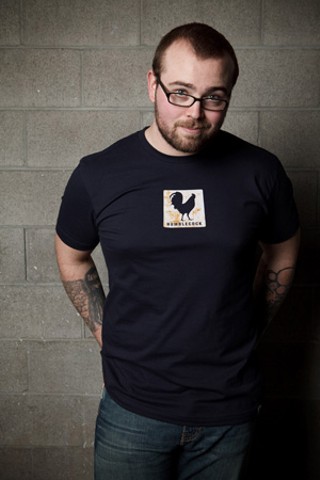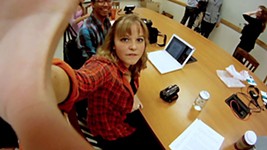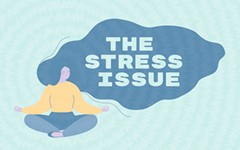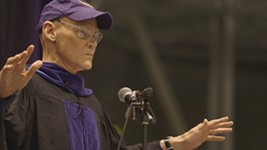The World Is Your Cubicle
Making it work, geography of no consideration
By Nora Ankrum, Fri., March 4, 2011

Here's a noble cause: finding a cure for Mondays. Sarah Cooke, founder of local consulting firm Fig Strategy, says her "personal mission" since high school has been "to see that as many people as possible Monday morning – when that alarm clock goes off for work – don't groan." As Cooke plans to discuss during her SXSW Interactive panel, Go Virtual: Save Money, Sustain People and Planet, technology is allowing companies to break away from traditional ways of doing business, moving many toward a "distributed working" model that can eliminate the office altogether, along with that Monday-morning feeling of dread.
The trend toward long-distance working began as a strategy for "recruiting and retaining talent," says Cooke, as industries anticipated a creative class shortage and the entrance of "digital natives" into the work force. For Gen Y workers, "it isn't about the corner office," says Cooke. "It's more about, 'I want to be able to work from whatever country I'm in because I've got things I want to do as a person.'" But then, she says, "The economic downturn made it about money, because it became about real estate ... a huge bottom-line expense." From large corporations to law firms to the federal government, organizations are following the trend in droves, says Cooke, because distributed working can save "billions of dollars a year."
Still, despite its appeal, the work-from-whatever-country-you're-in model isn't "all flowers and puppies," as Cooke puts it. Managers often dread the loss of control, others fear the technology necessary to keep everyone on the same page, and most, on some level, mourn the loss of community that otherwise goes hand in hand with proximity. Many of the participants at SXSW this year have dealt with these challenges in some way, including Web developers Jason Lengstorf and Thomas Sturge, who are heading up a panel called I've Never Met My Coworkers: Running International Teams.
Lengstorf formed Web development firm Copter Labs with Sturge and three other developers he'd met through social networks and Twitter. Lengstorf plans to talk about "creating a sense of community as opposed to five dudes who chat on the Internet" and will share "the tools we use to keep track of projects – how we make sure that five guys across eight time zones are all on the same page. Though they all live in different cities, they have gone beyond a 'commodity-based' relationship in which I get the project, then I send somebody a task, they complete it, and then I get an invoice, and that's the entirety of the communication," says Lengstorf. Communication was particularly challenging at first, given the visual nature of the company's work. "Whereas it would take about 10 seconds to point to an image and say, 'This is what I don't like,'" says Lengstorf, conversations instead sounded more like, "Well, the weird blue thing with the border, can you make the border less this?"
The team took a counterintuitive approach to resolving the issue, confining conversations primarily to Skype chat and other texting methods; they now complete most projects "98 percent through e-mail or through various project management software" such as 37signals, says Lengstorf. "We were using the phones as a crutch at first, so we would end up having a lot of conversations that would just wander. ... So we just decided to kind of force it." The sink-or-swim approach forced both clearer writing – because "you don't get the chance to watch somebody's facial expression or gauge the tone of their voice," says Lengstorf – and a better understanding of each person's "communication style," allowing the team to find its own rhythm. Now, he says, he has met some of his co-workers in person, and it "was surprisingly not weird," although, he adds, "part of it is a product of the fact that I'm 25."
Technological hurdles pose more formidable challenges for long-established companies accustomed to doing business face-to-face, but Cooke makes the case that the trade-off is worth it. She points to The No Asshole Rule: Building a Civilized Workplace and Surviving One That Isn't, Robert I. Sutton's book about how organizations are affected by people who overtalk, brownnose, or exhibit any number of all-too-familiar negative workplace behaviors. As a happy consequence of new technologies, says Cooke, "What I'm finding is that the asshole behavior can be contained." She points both to simple examples, such as teleconferencing equipment that naturally discourages more than one person from talking at a time, as well as more advanced technologies that change how people subconsciously perceive one another. Some companies, says Cooke, are "working in virtual worlds" where they interact with one another as avatars that can be "taller or be stronger or have a fuller head of hair – those things we react to on a biological level, not necessarily consciously."
In an attempt to explore the biological side of relationships sustained by technology, local theatre maven Beth Burns is taking her decade of improv experience with the Groundlings to a whole new level in her newest production, You Wouldn't Know Him, He Lives in Texas. Burns is collaborating with London-based director Mimi Poskitt to put on a play about long-distance lovers – one in London, one in Austin – who sit down for a live Skype session with each other. (See "Long-Distance Theatre.")
Burns and Poskitt will demonstrate some of their long-distance rehearsal techniques during their panel, Artistic Collaborations via Skype: Turning Distance Into Drama, and will talk about the themes explored in the play. "The nature of the theatre piece itself," says Burns, "is about what makes a relationship real ... and also the nature of honesty: What can be revealed, what can be hidden in the technology?" She has confronted the same themes herself, having found, for instance, that she and Poskitt – who met online – both felt unable to commit to the project until they'd met in person. "When you're working on Skype, even if you shove your faces up as high as you can, you can never really make eye contact," she notes. "You can either look at the camera or you can look at the face, but you can't really do both." Admittedly, she says, "I think it's a false sense of security that you get from meeting somebody in person, but we'll go with it – intuition and all that."
"Having a beer with someone is still one of the most connecting things you can do," agrees Roy Christopher, a communication studies doctoral student at the University of Texas at Austin. Still, he says, "the nature of being human is having technology." Christopher is currently writing a book about human relationships with technology, which he'll discuss in his panel, Disconnecting the Dots: How Our Devices Are Divisive. "Every new technology falls on a continuum between obstruction and augmentation," he says, and as such it poses unexpected paradoxes. For instance, "Everyone says 'location doesn't matter' – but it makes location all the more important because you can choose to be anywhere."
Liz Elam is attempting to address that paradox through her Austin company, Link Coworking, which provides a workspace – with ample coffee, parking, meeting rooms, and ergonomically conscious furniture – for those who need a break from the home office. "I've sat in the cube farm in corporate America," she says, "and just watching corporations shutting down a lot of business space and people being sent home." That trend "has left a kind of void in society that co-working is filling," she says. Elam spent two years studying co-working spaces all over the U.S. before she opened her own, and the experience taught her about forming communities. Through partnerships with other businesses, she offers members access to discounts on project management software and health insurance, and she hosts book clubs and speaker series as well. "I call myself a curator," she says, "because I'm constantly introducing members to other members."
"It's certainly an interesting time that we live in where we can explore the opportunity to have relationships with people we never would have dreamed of meeting in our entire lives," says Burns. Technology is "turning heroes into mentors, turning people on the other side of the world into collaborators, into friends, into connections," she says. "There they are; their face is right there – and if they are generous enough to look straight into the camera rather than looking down a little bit, it feels a lot like a proper connection."
Related Panels
Artistic Collaborations via Skype: Turning Distance Into Drama
Saturday, March 12, 9:30am, ACC, Room 18ABCD
I've Never Met My Coworkers: Running International Teams
Saturday, March 12, 11am, Hilton, Salon D
Disconnecting the Dots: How Our Devices Are Divisive
Sunday, March 13, 9:30am, ACC, Room 6AB
The Evolving Workplace: Environments, Methods, Trends and Management
Sunday, March 13, 12:30pm, Marriott Courtyard
Go Virtual: Save Money, Sustain People and Planet
Monday, March 14, 12:30pm, ACC, Room 5ABC












